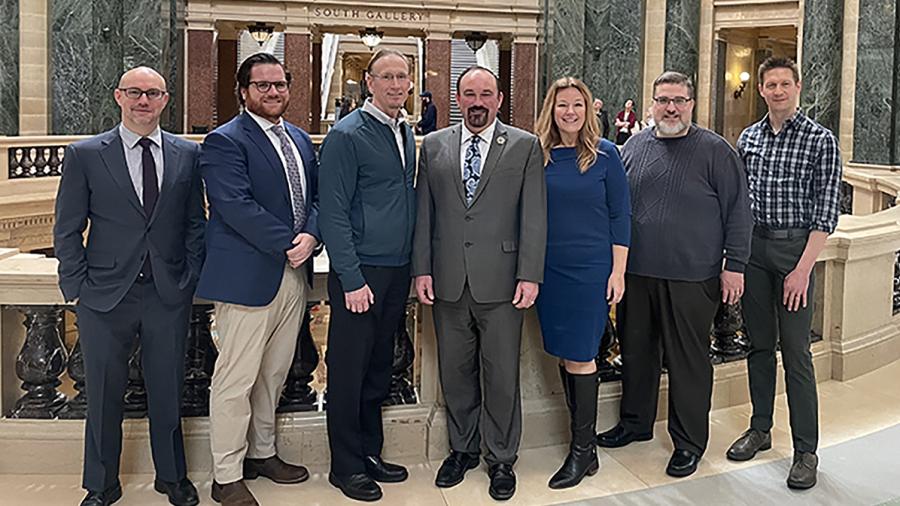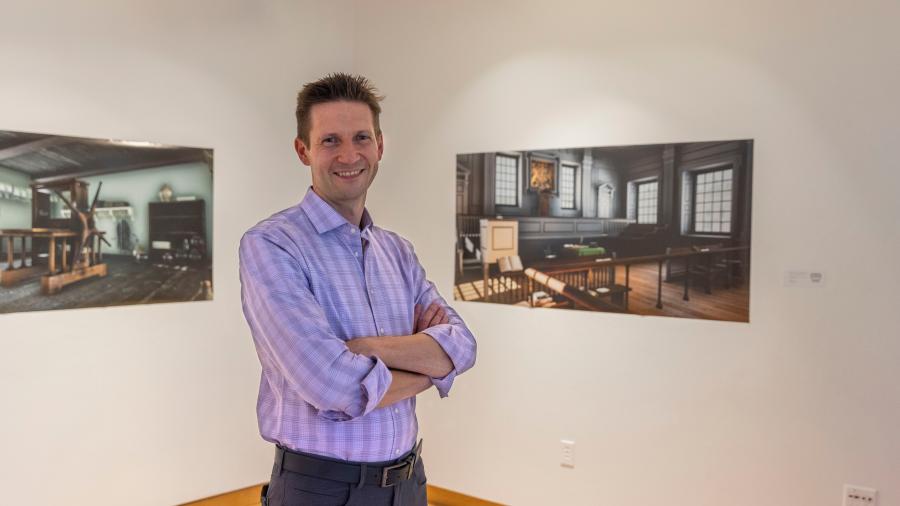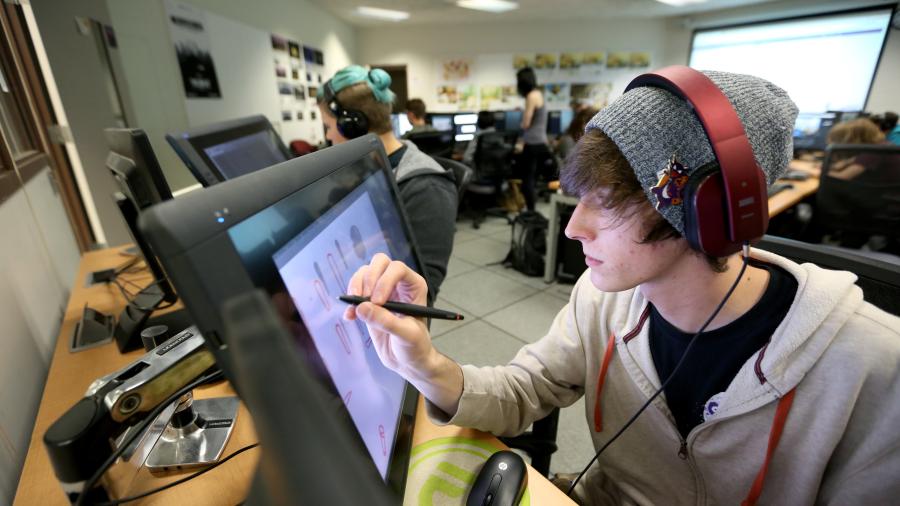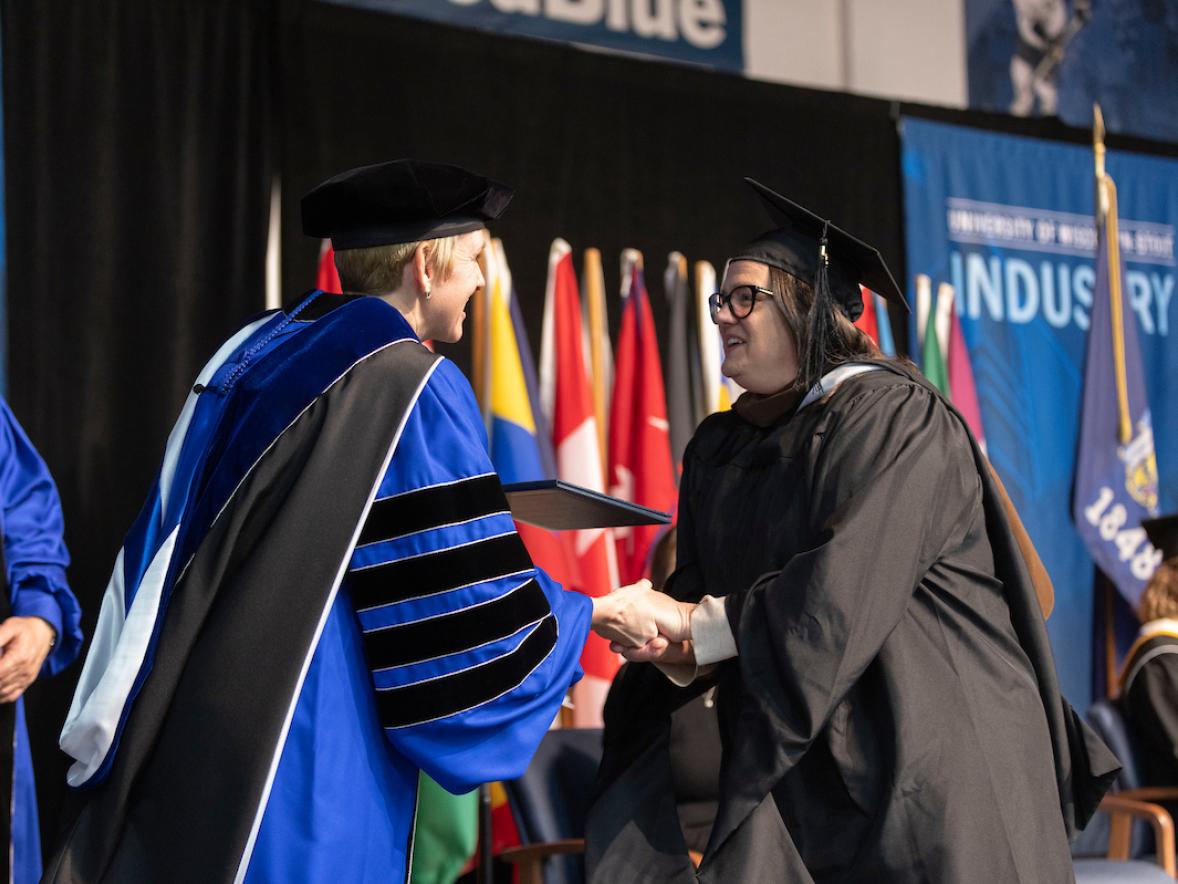With three nationally ranked programs in game design, UW-Stout is a leader in the Midwest in providing skilled talent for the digital interactive media industry.
The university has graduated hundreds of students in the field and has more than 350 on their way to a degree. Many of them want to stay in Wisconsin and build their careers here, but the jobs often aren’t available, Professor Andrew Williams told the Senate Committee on Universities and Revenue during a hearing Wednesday, Jan. 31, and the Assembly Committee on Ways and Means on Thursday, Feb. 1, at the state Capitol.
“The talent has always been here, but it doesn’t always stay here,” Williams said, noting that less than 20% of UW-Stout game design graduates remain in Wisconsin compared to 60% of UW-Stout graduates overall.

Senate Bill 970 and Assembly Bill 1033 being considered by the Legislature could change that dynamic. If passed, it would provide a 30% annual tax credit on salaries for digital interactive media jobs in the state and a 30% credit for infrastructure, such as software and equipment.
The bill’s sponsors believe the credits would fuel a surge of activity by strengthening existing companies and attracting new ones, including start-ups. To be eligible, businesses would need at least half of their employees to live in Wisconsin.
In the U.S., video games have become a $56.6 billion a year industry, nearly quadrupling in the past 10 years, according to Rep. Clint Moses of Menomonie, a bill co-sponsor and UW-Stout graduate. Also co-sponsoring the bill is Sen. Jesse James of Altoona.
“Our universities already offer amazing programs in this industry. With video gaming being such a desirable field for entrepreneurs and employees alike, especially among our state’s youth, legislation like this ensures our future generations are in the running for these careers,” Moses said at the Assembly hearing.

UW-Stout has programs in game design and development-art and in computer science-game design concentration. Also, the university has a Master of Fine Arts in design with a game design focus. The programs, which use an industry standard motion capture studio as part of their many labs, are ranked No. 1 in Wisconsin and No. 6 nationally among public universities.
“It’s always a bittersweet moment when I hear of our top graduates starting their careers elsewhere out of necessity,” said Williams, a Wisconsin native.
Worldwide, the video game sector is the largest in the entertainment industry and is expected to grow by 8.76% in the next three years, according to co-sponsor Sen. Patrick Testin of Stevens Point. “This industry has the potential to open up a lot of great economic growth here in Wisconsin,” he said.
Andrew O’Connor, of the Entertainment Software Association, testified that the state incentive “would go a long way to not forcing (Wisconsin) to export its talent to other places.”

Executive Tim Gerritson of Lost Boys Interactive, which has a Madison office, said similar tax credits are being offered to game companies in other states and have played a major role in Quebec, Canada, attracting 200 game design companies employing 11,000 people. The tax credit in Quebec is 37.5%, he said.
“This credit would put Wisconsin on equal footing. It’s about hiring people here to build on our infrastructure,” said Gerritson, an Oshkosh native who initially left Wisconsin to find work in the industry.
Gerritson serves on the game design program advisory committee at UW-Stout.
“I need to hire 100 people over the next year. I’d rather hire them here,” Gerritson added, noting that about half of the company’s 70 Wisconsin employees live in Madison but the other half, working remotely, live in cities such as Green Bay, Hayward, Hudson and Merrill. The company’s average salary in Wisconsin is $125,000 a year, matching the industry average.
The tax credits would be used for “hiring more employees and building better facilities” in Wisconsin, Gerritson said.
Other game design companies with studios in Madison include Microsoft, Respawn, Activision Blizzard, PUBG, Epic Games, Zenimax, Filament Games and Roundhouse Studios.
Executive Nathaniel Blair of Krafton, which makes PUBG, said his company started six years ago, has grown to 60 employees and could double in size within a year. “It’s an opportunity for Wisconsin to really be the hub for the Midwest in game development. These are future-facing jobs as the industry grows,” Blair said.
Williams also testified that Wisconsin helped shape today’s video game industry. The role-playing game Dungeons & Dragons was created in Lake Geneva in 1974, and core technologies for 3D games were developed in Madison by a company called id Software. Williams is the author of the book “History of Digital Games: Developments in Art, Design and Interaction.”
The sponsors hope that the bills will pass this legislative session.
###
Group photo full caption
Along with UW-Stout Professor Andrew Williams, right, those who testified at the state Capitol in favor of the digital interactive media bill are, from left, Nathaniel Blair, Krafton games; Andrew O’Connor, Entertainment Software Association; Brian Raffel, Raven Software; Rep. Clint Moses, of Menomonie; Jennifer Javornik, Filament Games; and Tim Gerritson, Lost Boys Interactive.






